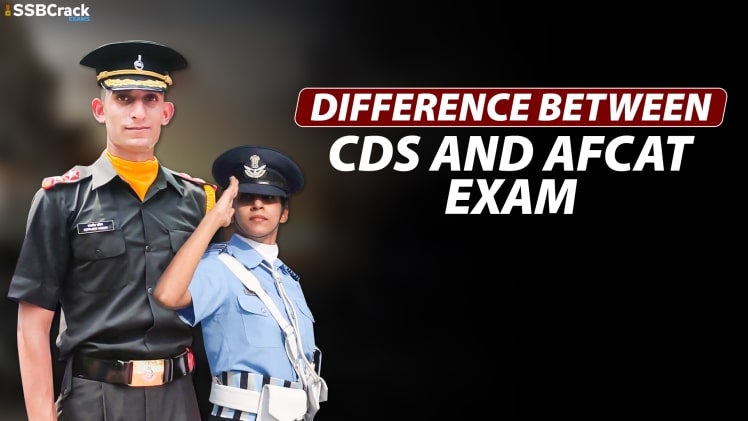CDS stands for Combined Defense Service Examination, while AFCAT is Airforce Common Admission Test. Each of these written exams is followed by an SSB to select suitable young boys and girls for the Defense forces of India. The Indian Air Force conducts the complete AFCAT process, and the Union Public Service Commission conducts the CDS Exam. Selected aspirants must go through the SSB interview, and the aspirants picked by SSB undergo a medical examination.
Both of these exams differ significantly from each other. Following are the points of differences between CDS and AFCAT:
Conducting Body and Frequency of exam- CDS exam is conducted by UPSC twice a year. On the other hand, AFCAT exam is also organized twice a year by the Indian Air Force. CDS exam is meant for selecting candidates for all three wings, i.e., Army, Navy, and Air Force, while AFCAT is taken to select young boys and girls for the Air Force only.
Notification of exam- Combined Defense Service Examination 1 notification comes at the beginning of November. Combined Defense Service Examination 2 notification comes in the last week of May, while Airforce Common Admission Test 1 notification comes at the beginning of the first week of December. Airforce Common Admission Test 1 notification comes at the beginning of the first week of June.
Time of exam- Combined Defense Service Examination 1 is conducted generally at the beginning of February every year, and Combined Defense Service Examination 2 is conducted generally at the beginning of September every year while Airforce Common Admission Test 1 is conducted generally in the last week of February and
Airforce Common Admission Test 2 is generally conducted in the last week of August.
Exam Results Time – CDSE 1: June and CDSE 2: January while the results of AFCAT are declared within a month of conducting the exam, AFCAT 1: end of March and
AFCAT 2: end of September.
Eligibility Criteria
The common eligibility for both CDS and AFCAT is that you should have completed a BA. In the case of age, the difference lies as follows:
AFCAT: Age criteria depend upon the course you are applying for.
- 19-23 years for a flying job
- 18-28 years for technical jobs
- 20-23 years for ground duties, if you are a graduate
- 20-25 years, if you are a PG
- 20-27 years, if you are a Med/Ph.D./CA/ICWA
CDSE: The age limit for different forces is:
- Indian Army: 19-24 years
- Indian Air Force: 19-23 years
- Indian Navy: 19-22 years
Both boys and girls can apply for AFCAT and get selected in the flying, technical, and ground duty courses. However, in the case of CDSE, only boys are appointed for the flying course, while girls can only join the OTA, i.e., SSC for the Non-Technical course of the army but not for defense, through CDS.
1. Exam Pattern:
The AFCAT exam consists of a single paper that contains English, GA, Mathematics, and Reasoning sections, with 100 questions each, which need to be resolved in 2 hours.
On the other hand, the CDSE exam consists of 3 sections, i.e., English, GA, and Mathematics, having 120 questions to be finished in 2 hours.
2. Level of Difficulty:
The level of difficulty varies for each section which is as follows:
In English, AFCAT has an easy level of passages, but in CDS, the level is on a higher side.
In Maths, AFCAT requires basic 10th level questions, but the CDS exam consists of high-level questions.
In General Awareness, AFCAT requires mainly current affairs, but the CDS exam consists of mixed domain questions and requires good knowledge of basics.
Points to note:-
- One significant difference between CDS and AFCAT is that CDS offers a permanent commission for flying branch to men. In contrast, AFCAT offers a short service commission for the flying branch only.
- The training for AFCAT is done by AFA (Air Force Academy), where candidates are given training for 74 weeks for flying and 52 weeks for non-tech branches. Training for CDS is conducted by IMA (Indian Military Academy, Dehradun), where candidates are given training for 1.5 years before joining as a Lieutenant in the Indian Army.
3. Criteria of Marking:
In the case of AFCAT, +3 marks are allotted for each correct answer and -1 for each wrong answer. Whereas in the case of CDS, a +1 mark is given for each correct answer, and a deduction of 0.33 is made for each wrong answer.
Conclusion
Both the exams are easy to crack if one has a clear and strategic plan. One should focus on conceptual clarity as once the concepts are clear, you don’t need to start fresh again. Check out BYJU’S Exam Prep to ace the exam now!
Stay Connected with our education blog & you can write for us about education.
